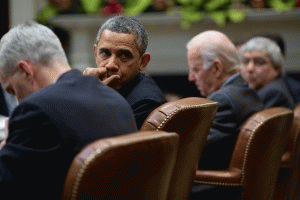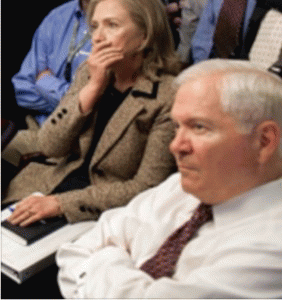From Consortium News

President Barack Obama, with Vice President Joe Biden, attends a meeting in the Roosevelt Room of the White House, Dec. 12, 2013.
(Image by (Official White House Photo by Pete Souza)) Details DMCA
Any fair judgment about Barack Obama's presidency must start with the recognition that he inherited a dismal situation from George W. Bush: the U.S. economy was in free-fall and U.S. troops were bogged down in Iraq and Afghanistan. Clearly, these intertwined economic and foreign policy crises colored how Obama viewed his options, realizing that one false step could tip the world into the abyss.
It's also true that his Republican rivals behaved as if they had no responsibility for the messes that Obama had to clean up. From the start, they set out to trip him up rather than lend a hand. Plus, the mainstream media blamed Obama for this failure of bipartisanship, rewarding the Republicans for their nihilistic obstructionism.
That said, however, it is also true that Obama -- an inexperienced manager -- made huge mistakes from the outset and failed to rectify them in a timely fashion. For instance, he bought into the romantic notion of a "Team of Rivals" with his White House trumpeting the comparisons to Abraham Lincoln (although some of Lincoln's inclusion of rivals actually resulted from deals made at the 1860 Republican convention in Chicago to gain Lincoln the nomination).
In the real world of modern Washington, Obama's choice of hawkish Sen. Hillary Clinton to be his Secretary of State and Republican apparatchik Robert Gates to remain as Secretary of Defense -- along with keeping Bush's high command, including neocon favorite Gen. David Petraeus -- guaranteed that he would achieve little real foreign policy change.
Indeed, in 2009, this triumvirate collaborated to lock Obama into a futile counterinsurgency escalation in Afghanistan that did little more than get another 1,000 or so U.S. soldiers killed along with many more Afghans. In his memoir Duty, Gates said he and Clinton could push their joint views -- favoring more militaristic strategies -- in the face of White House opposition because "we were both seen as 'un-fireable.'"
Seasoned Operatives
So, Obama's rookie management mistake of surrounding himself with seasoned Washington operatives with a hawkish agenda doomed his early presidency to maneuvering at the edges of change rather than engineering a major -- and necessary -- overhaul of how the United States deals with the world.

Defense Secretary Robert Gates and Secretary of State Hillary Clinton on May 1, 2011, watching developments in the Special Forces raid that killed Osama bin Laden. Neither played a particularly prominent role in the operation.
(Image by (White House photo by Pete Souza)) Details DMCA
Obama may have thought he could persuade these experienced players with his intellect and charm but that is not how power works. At moments when Obama was inclined to move in a less warlike direction, Clinton, Gates and Petraeus could easily leak damaging comments about his "weakness" to friendly journalists at mainstream publications. Obama found himself consistently under pressure and he lacked the backbone to prove Gates wrong by firing Gates and Clinton.
Thus, Obama was frequently outmaneuvered. Besides the ill-fated counterinsurgency surge in Afghanistan, there was his attempt in 2009-10 to get Brazil and Turkey to broker a deal with Iran in which it would surrender much of its enriched uranium. But Israel and the neocons wanted a "regime change" bombing strategy against Iran, leading Secretary Clinton to personally torpedo the Brazil-Turkey initiative (with the strong support of The New York Times' editorial page) as Obama silently acquiesced to her insubordination.
In 2011, Obama also gave in to pressure from Clinton and one of his key advisers, "humanitarian" warmonger Samantha Power, to support another "regime change" in Libya. That U.S.-facilitated air war devastated the Libyan military and ended with Islamic militants sodomizing Libyan leader Muammar Gaddafi with a knife and then murdering him, a grisly outcome that Clinton celebrated with a chirpy rephrase of Julius Caesar's famous boast about a conquest, as she said: "We came, we saw, he died."
Clinton was less upbeat a year later when Islamic militants in Benghazi, Libya, killed U.S. Ambassador Christopher Stevens and three other U.S. personnel, launching a scandal that led to the exposure of her private email server and reverberated through to the final days of her failed presidential campaign in 2016.
Second-Term Indecision
Even after Clinton, Gates and Petraeus were gone by the start of Obama's second term, he continued to acquiesce to most of the demands of the neocons and liberal interventionists. Rather than act as a decisive U.S. president, Obama often behaved more like the sullen teenager complaining from the backseat about not wanting to go on a family trip. Obama grumbled about some of the neocon/liberal-hawk policies but he mostly went along, albeit half-heartedly at times.
(Note: You can view every article as one long page if you sign up as an Advocate Member, or higher).





